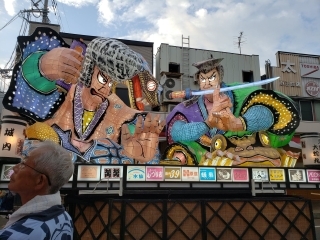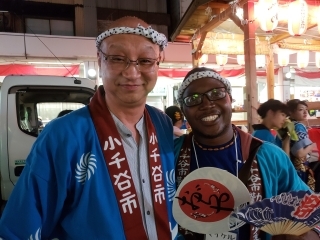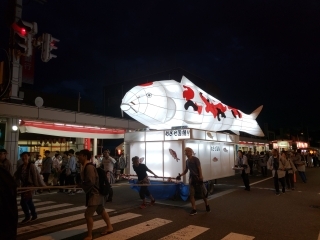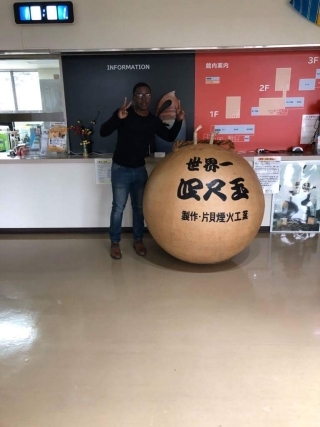JET Programme Series: Snow Country - Michael Daly



JET Programme Series: Snow Country - Michael Daly

I was placed in Ojiya City, Nigata-Ken Prefecture. I knew very little about this location prior to my placement but it’s a hidden gem. Fortunately, another assistant language teacher (ALT) from Trinidad (Shevon Williams), was also placed in this little town also referred to as ‘snow country’. He has been not only great comic relief but also been of great help due to his advanced Japanese and fearless attitude. This has helped to relieve the double culture shock that I would have experienced as some new ALT's do when they are isolated both culturally in another country and also within the JET community.
After the orientation in Tokyo, we left by bullet train (shinkansen) from Tokyo Station to Nagaoka station. When we arrived, we were greeted by our supervisor and two (2) other ALT's waving Trinidadian flags and posters with our names. After a short car ride of 30 minutes, we were taken to our Board of Education, after which we had lunch and then we were taken to our apartments. On our way there we were really able to take in the natural beauty of Nigata-Ken with its rolling hills, sweeping valleys and lush green landscapes. Upon arriving in Ojiya City, we were warmly welcomed by the head of our Board of Education (BOE) and the city mayor. Though we were not scheduled to meet him that day, he couldn't pass up the opportunity to pay us a visit. When we met him the following day, we were offered tea, took official photographs and he also offered us his business card.
I am enamoured with my placement because of the beauty of the tranquil Shinano River which snakes through the middle of the town, numerous rice fields and the misty outer mountain border region of Katakai. This town has a relatively small population but its festivals are world renowned for their display of colour, dance and food much like the Carnival celebrations in Trinidad and Tobago. The Ojiya festival took place on the weekend after the first week of school and one of my Japanese Teachers of English (JTE) Mrs. Fujitsuka invited me to meet her and other teachers to watch the dance that night. After overindulging on various festival delicacies such as karaage (fried chicken nuggets) and yakiniku (grilled meat on a stick), I tried to meet up with her using the map she drew for me. Needless to say, I got lost but she spotted me in the distance and waved me over. To my surprise, she gave me a Happi coat and ushered me to dance along with the school’s group. After many missteps, I learned the choreography and danced in unison with my students. Sharing this festival dance made me feel more at ease with my students and co-workers as they easily forgot how bad my dancing was.
The other assistants and I were invited to a drinking party after Ojiya festival and an older gentleman with the bravado from his sake and beer tried to explain to me in broken English and slow Japanese that the Katakai festival is unique because the fireworks are sponsored by individual families from the neighbourhood and are usually dedicated to mark the passing of a lost one or the celebration of an event like a birthday, graduation or wedding anniversary. This adds a personal touch to this grand spectacle as the names of the family members and a short message are read before the launch of each firework. This was in sharp contrast to the commercial messages that were read before at other festivals. At the Katakai festival, we got a chance to see yonshakudama, Japan’s largest firework. Before the big one, a loud horn went to signal the start. After which a small firework went off as a teaser. While we sat there confused by what had just happened; we heard a blast. We looked up and saw an explosion of bright yellow across the night sky. This was proceeded by the procession downhill of the mikoshi (portable shrines carried on persons’ shoulders) which including shouting, singing and drumming.
Since I have been here we have spent a lot of time on settling in. With a lot of effort and collaboration from our supervisors and fellow senpais (senior alt's) we were able to get all the necessary living and administrative matters completed. We were able to meet other ALT's from within the prefectures, interact with locals and try the various festival food sold at yatai (portable wooden food stalls) such as takoyaki (fried dumplings with octopus fillings), okonomiyaki (savoury dumplings with meat) and shioyaki (fish that is salted and threaded on stick) among others. I have also been invited to foam sword fighting. This was fun as we swung foam swords against dozens of persons in a field resembling an olden battlefield. A lot of the people, we met have been quite friendly and helpful. After getting lost on our first day, we mustered our best Japanese to ask an older lady watering her garden at the time for directions to the Shinano river (which is beautiful to view whether at night or during the day) - she promptly stopped what she was doing and walked with us leading the way for about 5 minutes to drop us off at the bridge.
There will be two (2) major events for school in August at Ojiya Junior High School, the Undokai (School Sports Day) in August and the school music festival held in October. The school will be buzzing with energy. I'm also equally excited and terrified to experience my first proper winter in the coming year. Last year, Niigata received records high snowfall (on average 2 metres high) which translated to postcard worthy imagery and ample opportunities for practicing snowboarding and skiing. I plan to try snowboarding in February with other ALT’s and skiing with my students in January. In the coming year, I hope to promote Trinidad via our school English Board and by including Trinidadian culture in my lesson plans as often as I can. I also brought my Trinidad & Tobago flag and other traditional wear to use a teaching tool throughout the school year so that hopefully by wearing them it can trigger a conversation. I have also decided to join a cooking class so that I can get involved with the community and participate in cultural exchange. As a result, I expect the school year will be an interesting one.
JET Series: Snow Country (Japanese Embassy's Facebook)
JET Programme Series Archives
